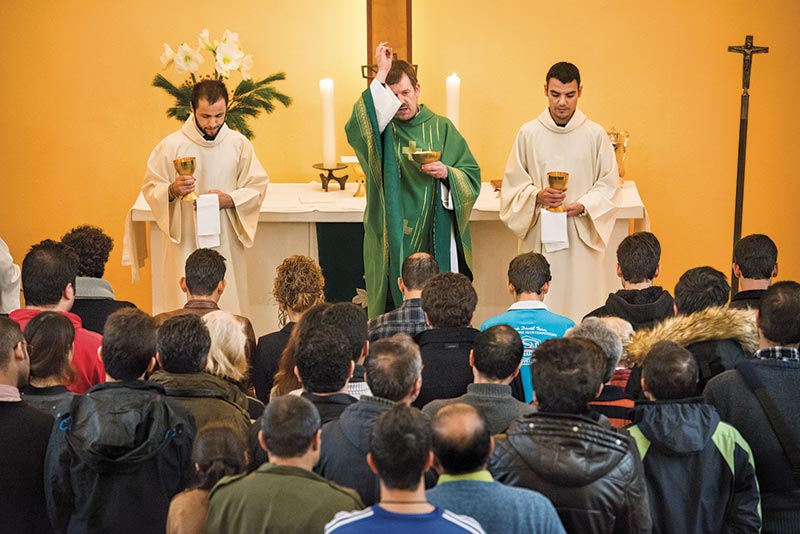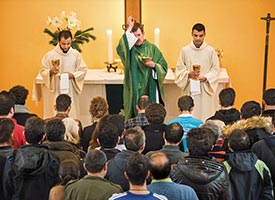
By Roger Drinnon
While an LCMS communications team was in Germany in mid-November, France fell victim to a multi-strike terror attack launched by ISIS. As the world mourns and heads of state coordinate full-scale military operations, these terrorist acts further complicate an already difficult question regarding the church’s role of mercy toward Middle Eastern refugees.
Yet, in the shadow of these events, the bright light of the Gospel shines in the darkness as our LCMS partner-church body, the Selbständige Evangelisch-Lutherische Kirche (SELK), cares for the stranger in their midst.
With more than a million Middle Eastern asylum-seekers flooding into Europe, a new mission field is growing exponentially for the SELK, a church body that has been actively receiving refugees and catechizing them for decades.
In light of the already strained capacity and infrastructure of Germany to handle this influx, the LCMS is coming alongside its German partner church and her congregations as they bear mercy to the refugees literally knocking at their doors. Synod President Rev. Dr. Matthew C. Harrison has authorized $100,000 from donated mercy funds through the Office of International Mission (OIM) to support SELK congregations in providing food, shelter, transportation, language instruction and the proclamation of the Gospel to people once considered impossible to reach. For good reason, the Church continues to confess that “nothing will be impossible with God” (Luke 1:37).
A mission field comes to you
The Rev. Thomas Seifert, pastor of Paul-Gerhardt Gemeinde (congregation) in Braunschweig, Germany, began his ministry to the refugees in 2012. Seifert said he is happy and amazed for the miracle that is bringing these people from countries closed off to Christianity to Germany, where the Gospel is freely preached.
“It’s such a chance as a missionary — you say ‘oh, what beautiful times’ — they are coming [to Germany] in crowds,” said Seifert. “‘Go therefore and make disciples of all nations’ [Matt. 28:19] — it’s easy to do when they are coming to you.”
Seifert’s efforts are part of the SELK’s growing mission work throughout refugee camps, including those in Berlin, Leipzig, Hannover, Düsseldorf and elsewhere in Germany.
Christian identity
“I tried to [prepare] my report for the [SELK] Synodical convention in the springtime and early summertime this year, and I started collecting the names of the congregations [helping] the refugees,” said SELK Bishop Hans-Jörg Voigt. “I [initially] counted 10 congregations, and after that we had the convention, and they called together another 10. So, we have 20 congregations serving the refugees, and they started generally by themselves, and that is deeply impressive — these congregations opened their doors.”
Voigt said SELK congregations — large and small — are caring for the refugees in body and soul, and some even help with required federal-court appearances. The Bundesamt für Migration und Flüchtlinge (German federal office for migration and refugees) subjects refugees to hearings and examinations to determine their eligibility to stay in Germany. Voigt said the ones who have converted to Christianity now must answer a litany of questions in court regarding Christianity and the Bible that in many cases are more difficult than questions asked during a typical confirmation examination. However, he said answers to these questions are subjectively evaluated by a government official who normally is not clergy or a theologian or even a Christian. Refugees who fail the examinations face continued living restrictions and potential deportation, as the refugee crisis has brought controversy, debate and even protests among native Germans, Voigt said.
“A lot of people in Germany are claiming that we are losing our base, we are losing our foundation and beliefs if we welcome [these refugees],” he said. “But I say we lose our roots and our Christian faith if we do not welcome them.”
Thank you, LCMS
Voigt said the LCMS mercy dollars are coming in two $50,000 disbursements, which allows time for SELK congregations who are assisting refugees to submit written requests showing what each congregation plans to do for refugees and the estimated costs. He added that this also ensures the funds are properly accounted for.
In an informal meeting Nov. 12 with the Rev. James Krikava, Eurasia regional director for the OIM, and a visiting team from LCMS Communications, Voigt explained that the SELK as a church body must keep accurate records of how donated money is spent. As a matter of best practice in mercy ministry, this helps ensure donor and recipient integrity. People giving directly to a single congregation is not recommended, as this can create accounting problems and burden a congregation that might not be well prepared to accept larger sums of money.
He said the SELK deeply appreciates everything the generous LCMS Lutherans are giving, noting, “We cannot do this by ourselves.” He said he also is thankful that the LCMS is not requiring the money to be spent within a certain time period, although the SELK will keep the LCMS updated on how such funds are used.
Talking with SELK pastors and refugees
The LCMS Communications team visited three congregations, including Seifert’s, and brought donated Bibles translated into Farsi (the language of the Iranian refugees) and Arabic as well as catechisms and prayer books in Dari. Concordia Publishing House provided several sets of the Growing in Christ Bible-story posters that include summaries of the Bible stories in five languages, including Arabic.
The LCMS delegation visited the Rev. Markus Fischer, pastor of the Evangelisch-Lutherische St. Trinitatisgemeinde in Leipzig, Nov. 13, as Fischer led a weekly Bible study with refugees living in Leipzig, most of whom had fled from Iran. Others were from Afghanistan.
Fischer explained that Iranian refugees are more inclined toward Christianity, due to several factors including their suffering endured under the current Islamic regime in Iran. Another factor is that Islam was forced on the people of Iran who were historically rooted in Zoroastrianism. Today, there are roughly half a million to a million Christians in Iran who are part of the underground church who must hide their faith or be imprisoned, tortured or killed.
Refugees from other Islamic nations indicated they had seen the worst of Islam.
“I fled from war in Afghanistan to Iran,” said Alnaz, who asked that she be identified only by her first name for safety reasons. “I thought the Muslims in Iran would help, but they didn’t because I was a foreigner.”
Alnaz said that since coming to Germany, she has seen how benevolent Christians can be — with no expectation of payback — so she attends the weekly Bible study. Her comments were echoed by other refugees in the room who added that the violence, oppression and politics they had experienced under Islamic governments drove them from their countries and from Islam.
One refugee lamented as the others nodded in agreement, “The violent attacks by the Islamic State are exactly what the Koran requires.”
When asked how American Christians should approach Muslims with the Gospel, the refugees agreed that demonstrating their Christian faith through the way they live in contrast to Islam is essential.
“Let them see and ask questions,” one refugee said.
Some refugees described their fleeing from Iran, recalling that many died along the way. Turkish soldiers had orders to shoot them on sight as they fled through Turkey. Others trekked through Serbia and Hungary, and one group described hiding in a forest for a week with no food or water.
The refugees all agreed they are much happier in Germany, and they are very thankful for the SELK congregations who have cared for them, even as they spoke of the challenges of life in a new land and culture and the longing for loved ones left behind.
The Rev. Dr. Gottfried Martens, pastor of the Dreieinigkeits-Gemeinde, a SELK church in Berlin-Steglitz, was thrust into the international media spotlight due to the hundreds upon hundreds of Muslim refugees converting to Christianity within his congregation. Owing to the number of media requests he now receives, the modest SELK pastor only accepts requests for coverage that might help his congregation.
“They keep coming and coming — no one can say how many more there will be,” said Martens. “Every gymnasium in every school in Berlin is full of beds. We have no idea where to put the next refugees.”
More are knocking on his door every day, especially Iranians and Afghans who make up 95 percent of his congregation.
During a service Nov. 15, 10 more refugees who had completed rigorous catechesis and an examination of their faith and who also demonstrated consistent church attendance and participation were baptized. As they renounced Satan in the baptismal rite, each catechumen also openly renounced Islam. More than 300 fellow refugees attended the service. With the pews and balcony so full, extra chairs were brought out into the aisles to seat more as others stood in the stairwells.
“There is an awakening among Farsi-speaking [Iranian] people worldwide,” Martens said.
Remarkably, the refugees in Martens’ congregation are evangelizing not only to other refugees but also to native Germans. Mary Bunyan said she joined the congregation after refugees came to her neighborhood looking for German-language instruction. One of them invited her to his baptism, and she has been with the congregation ever since.
“Jesus is in the middle of it,” said Bunyan. “It is so amazing how He is working here!”
Final thoughts
LCMS Chief Mission Officer Rev. Kevin Robson offered the following thoughts:
“Acts of terrorism, the darkness of humankind in rebellion against God’s goodness, the utterly fallen nature of a sin-corrupted creation — in Paris and in countless other places around the world — these are the contemporary symptoms of a great war being waged against Christ and His bride, the suffering Church.
“In these ‘last days,’ the only source of genuine, eternal hope is this: ‘Jesus is in the middle of it.’
“As we thank God for what He is working among these refugees, may we all with Luther pray: ‘Lord, keep us steadfast in Your Word, curb those who by deceit or sword, would wrest the kingdom from your Son, and bring to naught all He has done.’ ”
To make a gift to the Synod’s “Christ’s Care for the Persecuted and Displaced: Mercy for Body and Soul” fund, visit lcms.org/givenow/CCPD.
Roger Drinnon (roger.drinnon@lcms.org) is manager of Editorial Services for LCMS Communications. Deaconess Pamela J. Nielsen (pamela.nielsen@lcms.org) associate executive director for LCMS Communications, assisted with this story.
Posted Nov. 20, 2015
